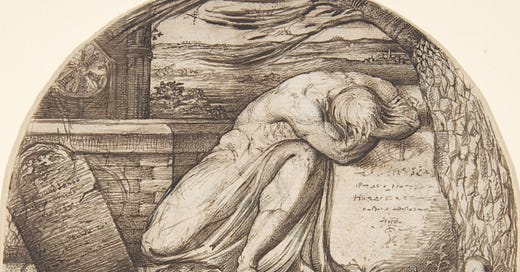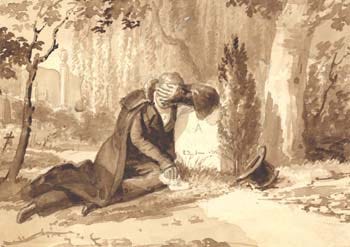Lanterns Upon the Graves
Wherein an old man visits a darkened graveyard to understand the price of suffering.
The old man stood amongst the graves with his tall companion at his back, though perhaps companion wasn’t the right word for the enrobed figure. The night was cold, but not too dark thanks to the presence of a waning half-moon. Heavy clouds passed overhead, their bulbous purple-gray bodies limned in silver moonlight and plump with snow waiting to fall. With slow implacability, they crept along on a winter’s wind that rustled through pine and conifer and the bony branches of leaf bare trees.
This was the third time tonight that the old man had accompanied one of these odd companions which he’d been assigned. The assignment came shortly after his sleep when he was visited by an image of an old work associate and business partner, a fellow whom the tired old man should first have considered a friend. Those old habits were hard to put down, though, particularly for an embittered elder like himself. All the same, now that he at last accompanied the third of his companions, he realized just how much more pleasant the first two had been.
A sudden bluster blew through the graveyard. It kicked up dust and dirt, only just visible in the light of the moon and some nearby lanterns. The old man, dressed in naught save a nightcap, sleeping gown, and some old slippers, pulled his garment tighter around his wrinkled and reedy body. Alas, the fabric was about as thin as his geriatric physique and offered very little protection against the wintry chill. He shivered, teeth chattering, and hadn’t realized he’d stopped in his tracks until he felt the hand of his companion placed upon his back.
Somehow, that hand felt even colder than the air around them, and the old man quickly shuffled forward. Oh why, dear friend, did you saddle me with such a being? he asked himself. He would not dare voice such a thing aloud, not with this stranger.
The one that accompanied him stood a full two heads taller than he. Like himself, the enrobed figure was lean and reedy. Though he’d never seen them, the tall fellow had bony hands much like his own. The old man silently envied him his robes. The stranger kept his hands tucked away in there, doubtless to help keep them warm like the rest of him would be. Clearly, though, it hadn’t worked so well. Otherwise the old man wouldn’t have felt that chill in his back at the fellow’s touch.
While the old man did yearn to wear those heavy robes, he did find them to be of a strangely disquieting sort. Black and heavy and many layered, they appeared to him to be the robes of a mourner, complete with a hood and heavy shawl which were drawn and draped about the tall stranger’s head. A veil hung there as well, semi-shear and black as the rest of him. Even if he tried, he couldn’t see through to get a look at the stranger’s face, not that he particularly wanted to. The prior companions he’d been assigned wore colorful outfits or clothes that were nicely tailored if a bit worn. They were warm and welcoming, even when he wasn’t entirely. This one, by contrast, reminded him much of that old ferryman of dour disposition from Greco-Roman legend.
On through the graveyard they traveled, following a path that wound between mausoleums and along very old plots. Despite their slow pace, it wasn’t very long before they reached a place where two lanterns lay. To the right, just a single plot removed from the path, one lantern sat upon a short and plain gravestone. Upon the grave it self lay a man in a tattered old frock coat with a weathered suit to match. His arm draped across the headstone and head buried in his hand, he trembled and wept upon the small, plain grave. The old man stepped forward, bundling the loose fabric of his sleeping gown in his hands at his chest. Who was this poor man who mourned at midnight?
Familiarity struck him like a knife to the heart when his hand fell away and he reached for his seam split hat, which had tumbled a short ways off. He was young and fairly handsome, the sort of man who could find a woman of some status were he a person of means himself. Alas, the young man was not. The clothes upon his back were evidence enough of that, but they weren’t what struck the old man so fiercely, no. For indeed, the old man knew the young man quite well, for he was that young man’s employer.
But for whom did young Robert weep? A glance at the grave told all, for though the old man couldn’t read the name in the dark, he could recognize what was left leaning upon the gravestone. A small crutch, sized for a young boy.
“Oh, Timothy!” the old man wailed, falling to his knees upon the grave. He clutched the crutch close and turned to his enrobed companion. “Tell me, please! What must be done to undo what shall be?”
Slow and silent, the figure in black turned to the second lantern. It hung from the branches of a leafless oak atop a distant hill, and illuminated a grave being freshly dug by two men. They laughed and they snarked and they mocked the man who would fill that cold hole on the top of that solitary hill. Though the old man couldn’t hear the name of the deceased, he knew that he must be of a most irredeemable sort to be so ridiculed.
As the men left, they approached the empty grave. Dirt and mud stained the gravestone despite being freshly placed. It seemed the soon-to-be occupant was so despised that his gravediggers couldn’t be bothered to wipe clean the name. Yet, as he looked into that dark hole, he couldn’t escape the feeling that it was calling out to him. He stepped back from the edge with a start, running into his tall companion as he did. For the first time that night it made a sound, a hissing huff of breath that seemed to linger in the old man’s mind. He wished to flee this place, to be free of these visions to which he bore witness! However, though the urge to run was nearly overwhelming, he couldn’t resist staring at that muddy gravestone. He couldn’t resist the need to ask the question that lingered just as stubbornly as the shrouded fellow’s hissing breath.
“Who’s lonely grave is this?” he asked.
His companion reached out with a long, slender arm. Far longer than it had any reasonable right to be. The robe slipped away and revealed a hand, but unlike what the old man believed it was not at all like his own! Stripped of flesh and bound in black cloth, he screamed as the skeletal hand scraped the mud away to reveal precisely that which he feared! This cold grave, this empty hole on an isolated hill? It was his own!
“No!” he cried, and he turned to flee! But the fellow’s reach was longer and swifter than his own legs, and with hardly an effort they wrapped about his waste and pulled him into the darkness!
“Forgive me! Please, I repent!” he begged, thrashing and flailing as his thin old fingers dug into the dirt and he dangled over the infinite pitch of his own grave!
“Forgive me!”
His cry was met with a stumble and a thump upon a floor of hard wood. Panting and panicked, he scrambled to a seat and looked around to find… his bedroom.
“I… I’m home?” he stuttered, and then he scrambled to the window to throw open his curtains.
Morning light wafted in, golden and beautiful through the gap of plump, snow-filled clouds. With a tearful laugh, he threw the door open and breathed deep of the chill morning air! And as he did, there, down on the street below him, a young crier boy passed with a bundle of newspapers in a satchel slung about his shoulder. He called to the boy, asked him the day, and when the lad answered the old man cheered with delight!
“Oh good! I haven’t missed it!” he proclaimed before scrambling to dress himself and hurrying out of his door.
Ebenezer Scrooge found himself returned to London on Christmas Day in 1843, and he realized he had much to do in order to do right by his most loyal employee, Bob Cratchit, and his family. For old Ebenezer had learned much on the eve of this most auspicious day. Lessons of what he gave up. Lessons of what he could lose.
But none of these lessons were so eye opening as when he saw the suffering his bitterness and greed caused those closest to him. And as he thought of good Bob and his old friend Jacob and all the good he might now do, the image of that black grave and robed figure lingered in the back of his mind, as did the sound of that hissing breath.
Suffffff…
The challenge was given and the challenge has now been accepted! I hope you’ve enjoyed my little Suff related twist on Scrooge’s encounter with the Spirit of Christmas Yet to Come, and I’d like to wish all of my dear readers a Merry Christmas, a belated Happy Hanukkah, and a most joyous New Years!






Oh no....The Suff is the ghost of Christmas Future.
I didn't expect that, but you did great.
Charles Dickens would like what you've added to the story.
But then, who's to say that the GoCF wasn't the suff all along?
Ha. The Suff as the ghost of Christmas Future fits well.